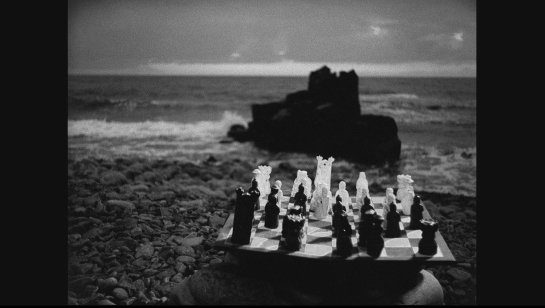The Solution
![5-the-seventh-seal-death[1].jpg](https://writinglikepunching.files.wordpress.com/2016/08/5-the-seventh-seal-death1.jpg?w=545)
“Isn’t that a burkini?” “Why do you all say that?”
Reading a really good book
, for the first time in a while, I find myself rediscovering, like a half-forgotten childhood memory*, the liberating force of literature. A sensation of openness, of anything being possible.
This sense of possibility is the underlying meaning of all strong, creative works. At any given moment, something entirely new can happen. Something liberating, life-altering.
And human creativity, our ability to find new solutions to the problems of the real world is this ability: to change the world with our minds. And to change ourselves. The act of creating, I think now, is the act of changing yourself first. You change into someone who is capable of solving the problem. For this new person you have become, the path that was shut is open.
In a haiku poem by the amazing Swedish Nobel laureate Tomas Tranströmer** (which a friend, knowing my predilection for chess, kindly translated to me from the Swedish), he writes:
Death leans in
Over me, a chess puzzle
And has the solution ***
Lately, as the world I live in has been forcing me and constricting me and the people around me, I’ve also been playing a lot of chess. I have found this ability in grandmasters to find good paths through a contested chess game to be tantamount to magic.
In fact, I’ve started to think of it as a simplified, abstract version of the practice of other creative forms. Writing literature is figured somehow in a game of chess. It is a way of navigating the contested space of language and the impingements and constraints of the material world and our own selves, in which the creative force of our own minds can suddenly lean in with the solution. Death, the annulment, is just another kind of solution. A way of changing the self so that solutions no longer matter. The ultimate solution of the problem.
I’ve written about this view of creativity before. I think now that I should dedicate myself more forcefully to the working-through of the chess problem, to finding the creative solutions. I don’t need, nor want, death’s solution. I need to solve life. Literature shows me that maybe a path can be found. It is a reminder to never stop the search for better moves.

“Best out of three?” “No.”
* I am nine, we have recently moved to a new country and I do not yet speak the language well. I am in the room of the boy next door. The house is pink, full of knick-knacks and his mother’s taste in wall-to-wall-carpeting and porcelain dogs displays the domination of the father and the boy on every shelf and coffee table, on the floor of every room.
The boy asks me to crawl into a small, low cabinet, really a small box where he puts his toys. I think that we are friends. I crawl into the cabinet. There is very little room. I wonder what he wants. He shuts the door quickly, and puts something heavy in front of it. My knees are under my chin, my head is bowed, there is no space. My mind goes dark. I am going to suffocate and die. I pivot and brace myself against the back wall, and my feet against the door, I push with all my strength. The door moves, but not enough. I can’t get leverage. I push and push, I can’t get out. I yell, my voice small and hollow in the box.
Suddenly, I find a hatch in the ceiling, I edge my way through it. There is a rope. I climb the rope through a crawlspace. Down below, the boy opens the box, looks in, cannot find me. He shuts it again, puzzled. I climb to the pitched roof, into the space of the blue sky, a scattering of clouds. I ascend gently, and escape across the rooftops and fly up, into airplaned heights, scooping up cloud-stuff as I go.
In fact, I start crying. The boy outside realises eventually, in a moment of insight, that he has made a terrible error. His game has caused pain. He opens the door. I leave the cabinet. He tries to apologize. I want to, but do not, break his jaw and his nose, I do not pound his head against the bedpost. But I don’t let him escape. I offer him no respite or absolution. He is trapped in knowing that he hurt me. I am free of the box, and of him.
Many years later, he comes to visit me. He works in the cement industry now, working a job on the other side of the hill. He has shed his childhood obesity and become a normal guy, a nice guy. He has a family. We have very little to talk about, and there’s a gulf between our lives. But that doesn’t matter. We respect each other in our knowledge that we will never be close. But right this moment, on my porch, underneath the green of late spring, the fluttering of birds, we are. He sits on my stoop, the leaves shimmer, we talk and laugh about old times. Over what we both became. Both of us having eventually escaped our childhoods, outpaced the confines. The box was the house, the problem our ability to hurt each other. We laugh, veterans of foreign wars, fought against the wrong enemy.
** If you haven’t read Tranströmer yet, run, don’t walk, and get Robert Bly’s translations, especially The Half-Finished Heaven. Or Robin Fulton’s Collected and Selected Poems which are equally good.
*** Man, those wacky Scandinavians. So much fun.
Nice one. Thanks.
Thank you!